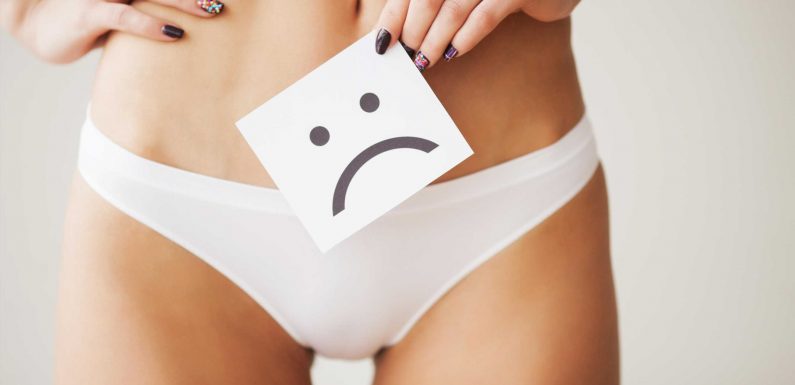
THE UNCERTAINTY of the coronavirus pandemic has meant we have all been focusing on our general health a little more than we usually would.
Whether it's what supplement is best for us or embarking on a new weight loss plan, it's important we look after our health.
Whilst taking care of the rest of our bodies it's important we don't neglect our vaginal health.
Gynaecologist Anne Henderson said most people know what to look out for when it's comes to looking after down below, whether it be an unusual smell or an unknown pain.
Anne, who works alongside Canesten, said there are some everyday habits that could be harming your vagina.
Here are five things to keep an eye on when it comes to keeping your vagina clean and healthy.
1. Showering
When it comes to cleaning down below, less is more. Experts say that just warm water is enough to clean your vagina.
Doctors have previously warned women not to use things like "vagina brushes" as they can be dangerous.
Anne said over washing and using harsh cleaning products can impact the health of the vagina.
“Women think as soon as they have a flare up in discharge or an increase in odour, they need to aggressively wash their vagina or use strong products to mask the issue but this is never going to help.
“Being overly hygienic such as showering twice a day can completely disrupt the natural bacterial all over the body, but particularly on the vulva and in the vagina."
She said that showering is much more hygienic than having a bath as you're not sitting in your own bacteria.
"There's no chance of the water being flushed up the bath into the vagina, which can cause irritation.
“My best advice would be to wash the vagina with warm water and make sure it’s dry after.”
2. Shaving
During the coronavirus lockdown those of us who were used to going to the salon for a regular wax had to make do with home products.
While hair removal comes down to personal preference, Anne says methods such as shaving can be irritating for the skin.
She said: "Of course, if you feel confident using shaving as a way to remove hair from your pubic area, continue doing so!
"If not, there are many other methods like waxing that can be more beneficial."
Anne said that shaving increases the risk of skin conditions such as cellulitis which can cause an infection to the hair root of the follicle.
“Shaving you're actually removing some of the skin surface hence it can bleed when you shave and can allow infection in and also disrupt the hair follicle itself.
“My advice would be to not shave the genital area, you can easily cut yourself and get an infection. If women want to remove hair then it must be done by somebody who's professionally trained in waxing.”
3. The Pill
Over three million women in the UK take the contraceptive pill while others opt for condoms or the implant.
The pill is a reliable form of contraception but Anne says that it has a direct effect on the pH within the vagina due to the synthetic oestrogen it contains.
While she advises that women should not stop taking the pill – it's important to be aware of the impacts it may have on your body.
"The lack of natural oestrogen affects the vagina pH, making it more alkaline which can trigger many vaginal problems, including BV,” Anne explains.
Anne continues: “The pill can alter the overall production of vaginal discharge because of the changes that the hormones cause, particularly in the cervix.
"You could end up with an erosion which is a hormonal change on the cervix, which can then lead to much heavier discharge production.
"It doesn't mean that it's an infection, it's just an excessive physiological discharge, which many women experience. It's not usually irritating or itchy.”
4. Underwear
Whether it's your big white bloomers or your lace knickers, most of us love slipping on our underwear.
But Anne said it's important to chose undergarments that give the vagina enough space to breathe.
"If somebody has recurrent problems, I will assume that they will have unnatural fibres in their underwear.
"I always recommend that you should wear cotton underwear rather than polyester.
"Always try and watch what you put on your skin. Tight clothing can also impact vaginal health, so try and wear loose underwear if you can.”
5. Antibiotics
Sometimes antibiotics can't be avoided and quite often we will be prescribed them for bacterial infections.
Anne says antibiotics can also affect your vaginal health.
Most read in Fabulous
RULE CHANGE 
Everything you can and can't do after Covid rules changed TODAY

Rebecca Loos looks unrecognisable after 'David Beckham affair' scandal

Mum's agony after son, 5, 'stabbed to death' as cops quiz woman on murder

Half a million forced to apply for more jobs or risk Universal Credit cut
She said that women who take them on a regular basis are more at risk of developing bacterial vaginosis (BV) – which is when there is too much of a certain bacteria in the vagina.
"Antibiotics will kill bacteria in the body, which may include good bacteria which lives within the vagina.
"The vast majority of antibiotics you take for common conditions will kill off lactobacillus in the vagina.
"This allows remaining organisms such as Peptostreptococcus, Gardnerella and yeast to thrive, which can cause BV of in the case of yeast, thrush", she added.
Source: Read Full Article




